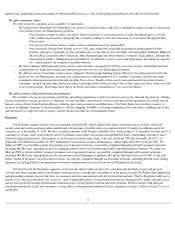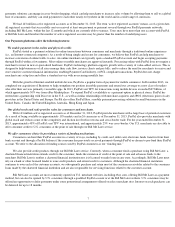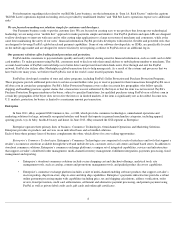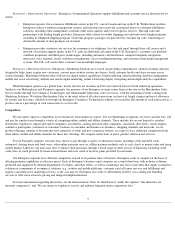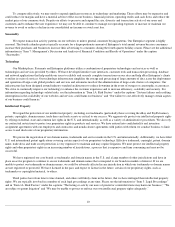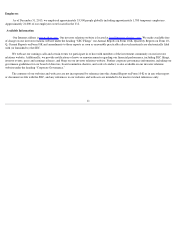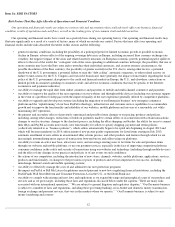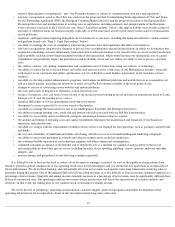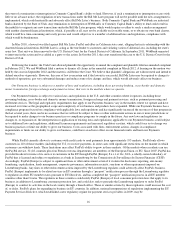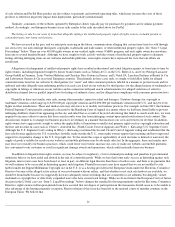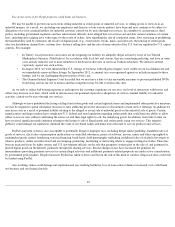eBay 2013 Annual Report Download - page 18
Download and view the complete annual report
Please find page 18 of the 2013 eBay annual report below. You can navigate through the pages in the report by either clicking on the pages listed below, or by using the keyword search tool below to find specific information within the annual report.
the event of a termination or interruption in Comenity Capital Bank’s ability to lend. However, if such a termination or interruption occurs with
little or no advance notice, the origination of new transactions under the Bill Me Later program will not be possible until the new arrangement is
implemented, which could materially and adversely affect Bill Me Later’s business. Both Comenity Capital Bank and WebBank are industrial
banks chartered by the State of Utah. Any termination or interruption of WebBank's or Comenity Capital Bank’s ability to lend could result in
the inability to originate any new transactions under the Bill Me Later program, which would require us either to reach a similar arrangement
with another chartered financial institution, which, if possible at all, may not be available on favorable terms, or to obtain our own bank charter,
which would be a time-consuming and costly process and would subject us to a number of additional laws and regulations, compliance with
which would be burdensome.
In May 2010, a lawsuit was filed against Bill Me Later, PayPal and eBay in California state court, alleging that in its relationship with the
chartered financial institution, Bill Me Later is acting as the true lender to customers and violating various California laws, including the state's
usury law. That suit was later removed to the U.S. District Court for the Central District of California. In September 2011, WebBank requested
to intervene in the action and was added as a party to the action. In October 2011, the court transferred the case to the U.S. District Court for the
District of Utah.
Following the transfer, the Utah Court allowed plaintiffs the opportunity to amend the complaint and plaintiffs filed an amended complaint
in February 2012. We and WebBank filed a motion to dismiss all claims in the amended complaint in March 2012. A hearing on the motion was
held by the court in September 2012 and the matter is still before the Court. We believe that plaintiffs' allegations are without merit and intend to
defend ourselves vigorously. However, this area of law is uncertain and if the lawsuit is successful, Bill Me Later may be required to change its
methods of operations, pay very substantial damages and reduce some of its charges and fees, which would adversely affect our business.
Our Payments business is subject to a number of laws and regulations, including those governing banking, cross-border and domestic
money transmission, foreign exchange and payment services, that vary in the markets where we operate.
Our Payments business is subject to various laws and regulations in the U.S. and other countries where it operates, including those
governing banking, cross-border and domestic money transmission, foreign exchange and payment services, such as payment processing and
settlement services. The legal and regulatory requirements that apply to our Payments business vary in the markets where we operate and have
increased over time as the geographical scope and complexity of our business and products have expanded. While our Payments business has a
compliance program focused on compliance with applicable laws and regulations and has significantly increased the resources of that program in
the last several years, there can be no assurance that we will not be subject to fines or other enforcement actions in one or more jurisdictions or
be required to make changes to our business practices or compliance programs to comply in the future. Any new laws and regulations (or
changes to, or expansion of, the interpretation or application of existing laws and regulations) applicable to our Payments business could subject
us to additional laws and regulations, additional licensure requirements and increased regulatory scrutiny, which could force us to change our
business practices or limit our ability to grow our business. Costs associated with fines, enforcement actions, changes in compliance
requirements or limits on our ability to grow our business, could have an adverse effect on our financial results and harm our Payments
business.
While PayPal currently allows its customers with credit cards to send payments from approximately 193 markets, PayPal only allows
customers in 110 of those markets (including the U.S.) to receive payments, in some cases with significant restrictions on the manner in which
customers can withdraw funds. These limitations may affect PayPal's ability to grow in these markets. Of the markets whose residents can use
the PayPal service, 32 (28 countries plus four French overseas departments) are members of the European Union, or EU. Since 2007, PayPal has
provided localized versions of its service to customers in the EU through PayPal (Europe) S.à r.l. et Cie, SCA, a wholly-owned subsidiary of
PayPal that is licensed and subject to regulation as a bank in Luxembourg by the Commission de Surveillance du Secteur Financier (CSSF).
Accordingly, PayPal (Europe) is subject to significant fines or other enforcement action if it violates the disclosure, reporting, anti-money
laundering, capitalization, funds management, corporate governance, information security, sanctions or other requirements imposed on
Luxembourg banks. Any fines or other enforcement actions imposed by the Luxembourg regulator could adversely affect PayPal's business.
PayPal (Europe) implements its localized services in EU countries through a “passport” notification process through the Luxembourg regulator
to regulators in other EU member states pursuant to EU Directives, and has completed the “passport” notification process in all EU member
countries other than Croatia. The regulators in these countries could notify PayPal (Europe) of local consumer protection laws that apply to its
business, in addition to Luxembourg consumer protection law, and could also seek to persuade the Luxembourg regulator to order PayPal
(Europe) to conduct its activities in the local country through a branch office. These or similar actions by these regulators could increase the cost
of, or delay, PayPal's plans for expanding its business in EU countries. In addition, national interpretations of regulations implementing the EU
Payment Services Directive, which established a new regulatory regime for payment services providers in 2009, may be
16


